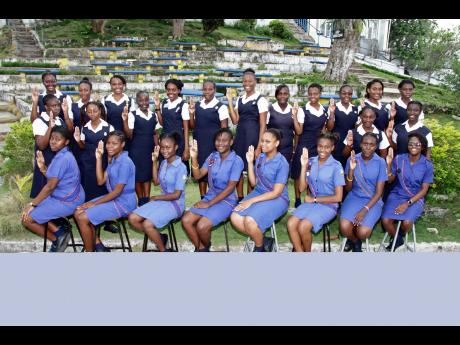'Put them in uniforms' - Push on to get more students to join uniformed groups to improve their discipline
Psychiatrist Professor Fred Hickling is appealing for more uniformed groups in schools to tackle indiscipline among students and to help divert youths from a life of crime.
The psychiatrist believes that these groups have been of tremendous benefit to former and current participants, who have learnt core values that have made them more productive and well-rounded citizens.
"It creates a new family. It creates a new team, and a lot of these young people need the love and security of a group and team that we usually get in a family which, because of the problems we have been having with families in our society, a lot of children don't experience the camaraderie, the warmth and the sharing of working within a team," Hickling he told The Sunday Gleaner.
"It helps with learning to manage authority and to manage power, which a lot of young people are missing in the lack of socialisation that we have now. Therefore, they tend to become lawless (and) an authority unto themselves," said Hickling.
According to safety and security coordinator with responsibility for uniform groups at the Ministry of Education, Courtney Berry, there are about 13 active uniformed groups in schools across the island. He says the ministry is pushing for an increase in this figure and is currently considering a proposal to have all grade seven students involved in a uniform group come September.
POSITIVE IMPACT
"The challenge is the financial resources, because these groups should be fitted with uniforms," said Berry, who has appealed to persons to partner with the ministry to help it achieve this objective.
Given the positive impact the uniformed groups have been having on students, he would ideally like to see them implemented in basic schools as well in the future.
"When a child is associated with a uniformed group, there are certain norms and ethos that deals with a uniformed group, for example, you learn how to be a team player, there is a certain amount of belonging, a certain amount of group ethics that is passed on. I believe that it has some kind of impact on a youngster that is a part of a uniformed group," said Berry.
In recent years, there has been a decrease in the number of cadet groups operating in Jamaican schools, with 2,700 current members instead of the 5,000 which the leadership believes would be ideal.
The Girl Guides Association of Jamaica is similarly short of members, and chief commissioner Marjorie Gaynor told The Sunday Gleaner that the number of members is decreasing.
"In general, like the other uniformed youth groups that I know of, over time we have had fewer persons participating," said Gaynor.
She argued that this is because there are a lot of other things to occupy the attention of adolescents today, unlike in the 1960s to 1980s, which she described as the "boom years" for the Girl Guides.
"Most of the stalwarts in society, many of the accomplished persons, if you talk to them, you will find out that as a child, they were guides or they were scouts," said Gaynor.
There are currently 5,000 Girl Guides across Jamaica, but Gaynor said they are in expansion mode with the assistance of the Ministry of Education.

